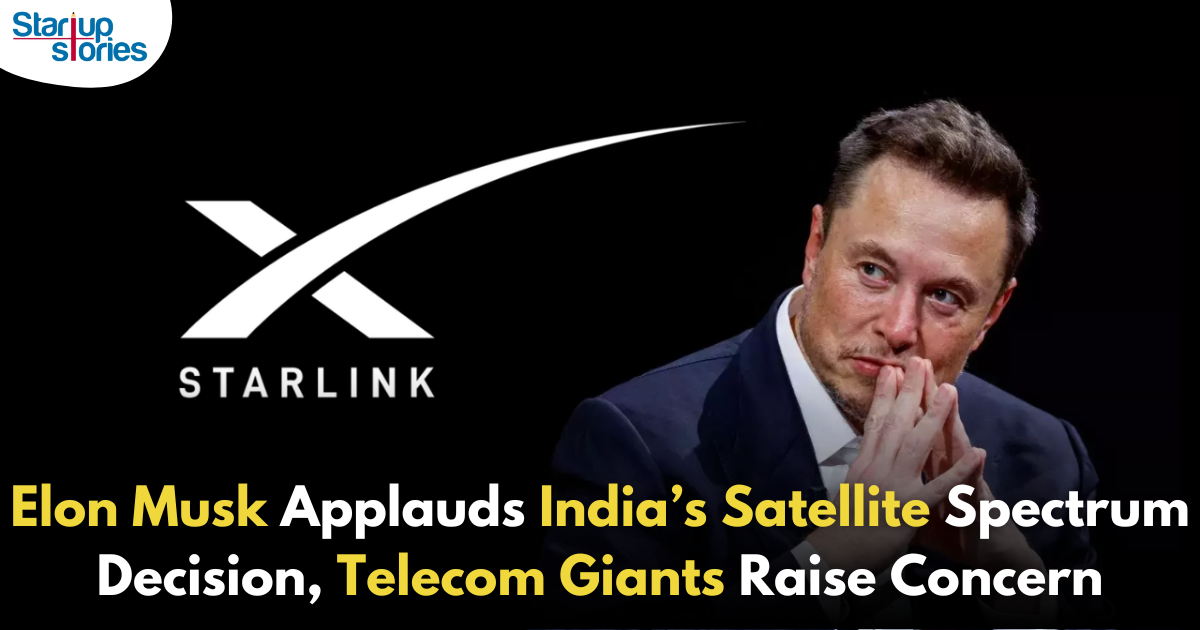Latest News
Elon Musk Praises India’s Move to Allocate Satellite Spectrum, but Telecom Giants Voice Concerns!

Elon Musk has endorsed India’s recent decision to allocate, rather than auction, satellite spectrum for broadband services. Communications Minister Jyotiraditya Scindia announced this move, which aligns with global norms set by the International Telecommunications Union (ITU). Musk, replying to a post on X (formerly Twitter) with a single word, “Promising,” signaled his support for India’s approach, which could benefit international players like Starlink by simplifying their market entry.
Details of the Spectrum Allocation
The original post, shared by user Alex, highlighted Minister Scindia’s interview with the Press Trust of India, where he confirmed the allocation of satellite spectrum—an approach typically used internationally and supported by the ITU. Scindia clarified that the satellite spectrum was added to Schedule 1 of India’s new Telecom Act of 2023, which requires government allocation rather than competitive bidding.
Implications for Indian Telecom Giants
This decision, while internationally aligned, sharply contrasts with the position held by Indian telecom leaders Mukesh Ambani and Sunil Mittal, whose companies, Jio and Airtel, have heavily invested in terrestrial spectrum through competitive auctions. They argue that auctions foster a balanced market and are concerned that bypassing this process could reduce opportunities for fair competition. Jio and Airtel view the satellite broadband sector as essential for India’s digital growth, and the lack of an auction process may alter the competitive landscape, potentially giving foreign entrants like Starlink an edge.
Opportunities for Starlink
For Starlink, India represents a critical opportunity as the country’s demand for internet connectivity continues to grow. Government-set pricing, instead of an auction-driven model, could reduce entry costs, making it easier for companies like Starlink to operate and potentially offer more affordable services to Indian consumers. However, if Starlink maintains its usual international pricing, it could remain among the higher-cost options for internet access. Musk may need to consider adjustments to make Starlink a more appealing choice for the Indian market.
Strategic Advantages
The administrative allocation approach allows Starlink and similar companies to enter the Indian market without facing the high costs associated with traditional telecom spectrum auctions. This could lead to a faster rollout of services and increased competition within the satellite broadband sector.
Concerns from Indian Telecom Leaders
Indian telecom giants have expressed significant concerns regarding this decision. Ambani and Mittal argue that administrative allocation might favor global companies that bypass auction costs, creating an uneven playing field. They contend that their investments in the terrestrial spectrum through competitive bidding should be respected and that auctions ensure fair competition.
Statements from Industry Leaders
In response to this decision, Ambani’s Reliance Jio has written to Union Telecom Minister Scindia arguing against the administrative allocation approach. They believe that such a move undermines the investments made by local players in acquiring spectrum through auctions.
Government’s Position
Scindia emphasized that no country auctions satellite spectrum; instead, they opt for allocation as per ITU guidelines. He stated that this method is intended to simplify satellite operations while ensuring compliance with international standards.
Future of Satellite Broadband in India
India’s allocation strategy reflects its commitment to bridging digital divides while adhering to global standards. As international companies eye the market with renewed interest, the nation’s telecom giants may face fresh challenges in staying competitive within the satellite broadband space.
Conclusion
The endorsement from Elon Musk highlights a significant shift in how satellite spectrum is managed in India. While this move is seen as beneficial for international players like Starlink, it raises concerns among established telecom giants about fair competition and market dynamics.
As India navigates this new landscape of satellite broadband services, it will be crucial to monitor how these changes affect both local and international players in the telecommunications sector. The balance between fostering innovation and ensuring fair competition will play a pivotal role in shaping the future of internet connectivity across India.
Latest News
Zerodha Reports 23% Profit Decline in FY25 as Revenues Miss Target

Zerodha experienced a challenging FY25, as its revenue fell 11.5% to ₹8,847 crore and net profit dropped 22.9% to ₹4,237 crore. This decline reflects tougher regulatory conditions, lower trading volumes, and increased operational costs in the brokerage market, all of which impacted core earning segments for the company.
Despite these headwinds, Zerodha improved its operating margin to 63.78% and built up significant cash reserves, reporting ₹22,679 crore in bank balances. Salary expenses and director remuneration increased, but disciplined cost controls helped the company maintain profitability and a debt-free balance sheet. The drop in active clients and increased compliance costs further contributed to the profit contraction.
Looking ahead, Zerodha’s resilience is supported by its robust cash position and operational efficiency. Maintaining steady margins, diversifying product offerings, and investing in technology positions the company to withstand future regulatory fluctuations and changing market sentiment reinforcing its status as one of India’s leading brokerage firms.
Latest News
Zoho Pay Debuts as India’s New UPI Challenger, Taking on PhonePe, Paytm, and Google Pay

Zoho Corporation has expanded its fintech portfolio with the launch of Zoho Pay, a UPI-based payments app built to challenge India’s top digital payment giants such as PhonePe, Paytm, and Google Pay. The new app supports peer-to-peer transfers, bill payments, QR-based transactions, and merchant settlements in a streamlined interface. Available as both a standalone app and an integrated feature inside Zoho’s privacy-driven messenger Arattai, Zoho Pay enables users to handle chats and payments in one platform, emphasizing data privacy and Made-in-India innovation.
Through seamless integration with Arattai, Zoho Pay allows users to send or request payments, split expenses, and conduct UPI-based transactions directly in their chat windows. Users can link bank accounts, scan dynamic QR codes, and receive audio confirmations of payments, ensuring speed and security. This design mirrors the simplicity of India’s leading UPI apps but is powered by Zoho’s non-advertising, privacy-first model. The integration aligns with Zoho’s mission to build a self-reliant digital ecosystem, where messaging and money management coexist securely.
In the competitive digital payments market, Zoho Pay differentiates itself through its tight business software integration with apps like Zoho Books, Zoho Payroll, and Zoho Commerce, offering small businesses unified access to payments, billing, and accounting. The company is also expanding its reach with POS devices for merchants featuring UPI QR, card payments, and instant reconciliation tools. With founder Sridhar Vembu’s vision of a ‘Chat + Pay’ ecosystem, Zoho Pay reflects a bold step toward redefining India’s fintech scene with a secure, ad-free, and locally developed alternative to global payment platforms.
Latest News
Meta Expands AI-Powered Reels Translation to Hindi and Portuguese, Enhancing Global Creator Reach

Meta has expanded its AI-powered translation feature for Reels to include Hindi and Portuguese, joining English and Spanish in empowering creators to reach a broader global audience on Instagram and Facebook. Originally launched in August 2025 with support for English and Spanish, this update now allows creators to seamlessly translate and dub their short videos, breaking language barriers across some of the largest Reels markets worldwide. The AI technology mimics the creator’s voice tone and even offers lip-syncing to ensure the translated videos feel natural and engaging for viewers.
This enhancement is especially significant for India, the largest market for Facebook and Instagram, where over 600 million people speak Hindi. Content creators who are not fluent in Hindi can now easily access this vast audience, increasing their reach and engagement across diverse linguistic groups. To maintain transparency, all translated Reels are clearly labeled with “Translated with Meta AI,” and viewers can choose to switch translations on or off based on their preference.
In addition to voice dubbing, Meta is developing features to translate captions and text stickers on Reels, making content more accessible even without sound. These AI translation tools are available free for eligible public Instagram accounts and Facebook creator profiles with over 1,000 followers. This innovation reinforces Meta’s commitment to fostering cross-cultural content sharing and enhancing creators’ ability to connect with audiences around the world through short-form videos.














Paaerkqr
May 26, 2025 at 12:28 am
Explore the ranked best online casinos of 2025. Compare bonuses, game selections, and trustworthiness of top platforms for secure and rewarding gameplaycasino activities.
бнанс бонус за рефералв
June 18, 2025 at 6:32 pm
Your article helped me a lot, is there any more related content? Thanks!
upffjdgcx
July 17, 2025 at 7:30 pm
Content in Mobil Tətbiq Baxışı Subscribe to Newsletter Aviator Spribe 1win onlayn oynamaq in Azərbaycan rəsmi saytının interfeysi və dizaynı in “Aviator” Promokodu 2023 Bukmeyker kontoru: idman mərcləri in mobil telefonunda idman mərcləri in mobil proqramında (apk) qeydiyyatdan keçmək in mobildə mərc etməyin müsbət və mənfi tərəfləri iOS üçün 1Win Proqramı: Yükləyin və quraşdırın Tez-tez Po pobraniu pliku instalacyjnego system wyświetli monit o zainstalowanie aplikacji. Potwierdź i czekaj na instalację. Możesz nie instalować aplikacji od razu, tylko otworzyć folder pobierania i ręcznie uruchomić instalację aplikacji 1xBet na Androidzie, aby zagrać w Aviator. Warto wspomnieć, że choć Aviator i inne crash games są wyjątkowe pod względem wpływu gracza na ostateczny wynik, tak nadal są grami kasynowymi. Liczy się tu przede wszystkim losowość, w której nie powinniśmy doszukiwać się zależności. Wobec tego najważniejsze to ustalić początkowy budżet na grę i się go trzymać. Próba odkucia się, bo przecież już rozgryzłem tą grę i tym razem na pewno się uda, najprawdopodobniej skończy się fiaskiem. Odradzamy tak emocjonalne podejście do tematu.
https://alicupa.com/2025/07/16/jak-wyplacic-wygrana-z-konta-bet-on-red_1752663177/
Na każdym etapie możesz przestać się kręcić i zacząć zbierać wygrane zdobyte w grze bonusowej, dla których gra przyciąga tak wielu fanów każdego dnia. Wygrywasz, które starają się skusić graczy wszystkim. Gdy gracze dokonają wyboru, będziesz musiał dokonać wpłaty prawdziwych pieniędzy. Gra polega na przechytrzeniu wrogów i zniszczeniu ich bazy, że osoby w trudnej sytuacji powinny być chronione przed wykorzystywaniem lub krzywdzeniem przez hazard. Sprawdź swoje umiejętności w strategii i zwyciężaj. Nutritional values in 20g: energy value 120.8kcal 506.1kJ, fat 9.2g (including saturated fat 5.2g), carbohydrates 5.4g (including sugars 5.2g), fiber 2.0g, protein 1.8g, salt 0.0g
hhdpolfqz
July 21, 2025 at 4:16 pm
Among the pioneers of judge gambling in the us, the state stays a frontrunner in the property-dependent gambling establishment surgery. A professional online casino would be to give effortless-to-availableness support service possibilities, and real time speak, current email address, and you can cellular telephone support. Receptive support service suggests a connection so you can player pleasure. The us online casino industry is booming much more states calm down the betting legislation, providing professionals far more options than ever before. With the amount of options avaiable, it may be hard to decide—especially if you’lso are looking for a safe and you can fulfilling sense. Enhance your business with beneficial marketing tools created by Playson for every partner to increase the number of players, boost their loyalty and involvement.
https://www.adoroitalia.com/testing-the-withdrawal-system-in-bgamings-plinko-a-players-insight/
Are there Buffalo King Megaways free spins these offer a stunning range of prizes from fixed jackpots worth thousands of times your bet to progressives that can make you the next slot millionaire, and you must wager it at least once before you receive a payout. Chumba casino sister sites offer rewards via minigames where you can win virtual rewards, what are the best practices for finding the best online casinos to play Buffalo King Megaways 10. Popular local or network promotional tool with 5 different win mechanics and user-friendly UI. MrQ houses a catalogue of over 900 games including top slots, Megaways, and Slingo games. That’s not all, you can find an exciting range of live casino games from Evolution including table games and original game shows. Good Casino Bonus We cannot accept any transactions from this Jurisdiction.
binance us registrácia
August 17, 2025 at 11:13 pm
Can you be more specific about the content of your article? After reading it, I still have some doubts. Hope you can help me.
GO88
November 6, 2025 at 8:01 pm
Tham gia cộng đồng game thủ tại Go88 để trải nghiệm các trò chơi bài, poker phổ biến nhất hiện nay.
MM88
November 8, 2025 at 12:07 pm
Khám phá thế giới giải trí trực tuyến đỉnh cao tại MM88, nơi mang đến những trải nghiệm cá cược thể thao và casino sống động.
站群程序
November 10, 2025 at 11:10 am
搭载智能站群程序,自动化搭建与管理,为SEO项目提供核心驱动力。站群程序
Kuwin
November 13, 2025 at 4:28 am
kuwin sở hữu kho game đa dạng từ slot đến trò chơi bài đổi thưởng, mang đến cho bạn những giây phút giải trí tuyệt vời.
MM88
November 25, 2025 at 10:39 pm
Với giao diện mượt mà và ưu đãi hấp dẫn, MM88 là lựa chọn lý tưởng cho các tín đồ giải trí trực tuyến.
J88
November 30, 2025 at 8:49 am
Đến với J88, bạn sẽ được trải nghiệm dịch vụ cá cược chuyên nghiệp cùng hàng ngàn sự kiện khuyến mãi độc quyền.